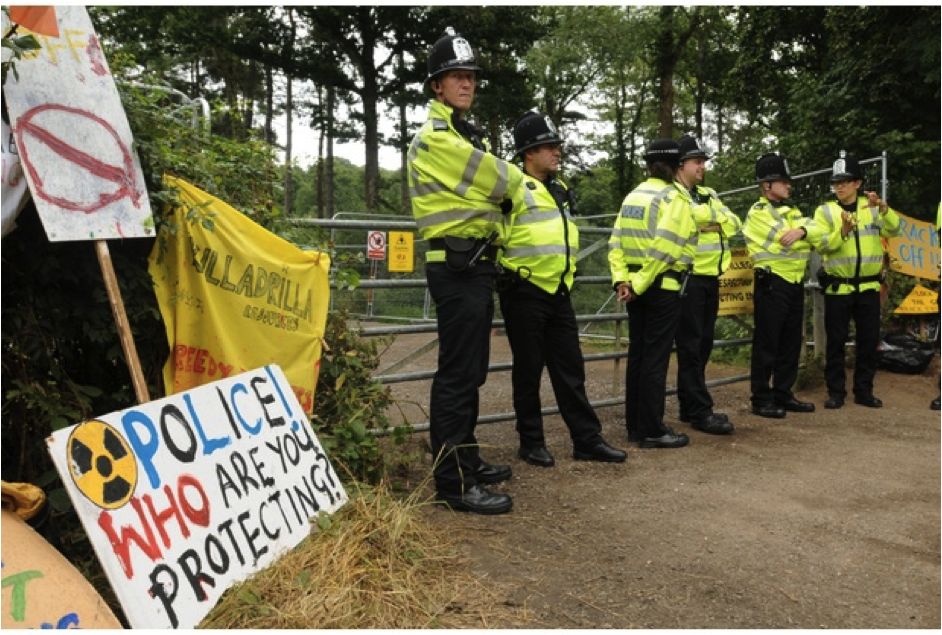8 reasons Greens should stand in Police & Crime Commissioner (PCC) elections

Adam McGibbon, Caroline Lucas’ campaign manager for the General Election, and now the Greens’ London Mayoral & Assembly campaign manager, gives some reasons why Greens should stand in the Police & Crime Commissioner Elections next year. (With input from Bright Green’s Adam Ramsay)
In the run-up to the 2012 Police & Crime Commissioner (PCC) elections, I was at a conference where representatives from all across the public and third sectors worried about the introduction of PCCs – they predicted a shambolic introduction, low turnouts, a dangerous turn towards right-wing populism in justice policy, and many other concerns. When this all came true, and with Labour promising to abolish PCCs if they won the general election, we had reason not to think too hard about the next set of PCC elections – it could well have been that they never would have happened. But they are happening, and Greens need to think hard about what we should do about them.
Here are eight reasons why Greens need to stand in the Police & Crime Commissioner elections on 5th May 2016:
1. Show how we are different
Unfolding events are making it even more urgent that we do more to show how the Greens are different to other parties. We have radical -and yes, popular – policies that we could present to the electorate.
We could promise to implement evidence-based drug policy – clean needles and state-provided support for addicts is proven to dramatically reduce crime, addiction and other social problems caused by drugs, to deal with the two thirds of all crime in the UK is said to be drug-related.
We couldn’t we make it the police’s priority to enforce housing laws and act in the interests of the UK’s precarious and persecuted private renters. We could ask, “Why do the police spend more time harassing black teenagers than ensuring bankers follow the law? Only one of those groups has a track record of trashing our whole economy.”
If we are trying to demonstrate that we are a serious political party, we need to show that we can hold our own in debates about the sharp end of political power – policing. Not being afraid to present policies that are radical will mark us out and demonstrate why the Greens are different from the other parties.
2. Broaden our appeal
One of the key lessons of the Scottish referendum was that when Greens talk about our policies on things other than the environment, and when the press are forced to talk about what we have to say on them, we tend to do well.
Some of the best coverage we’ve had in London over the years has been for work on police accountability carried out by the Greens on the London Assembly, who sat on the former Metropolitan Police Authority and on the London Assembly Police & Crime Committee. Greens have won plaudits for calling out the Met on stop and search, violence against minorities, terrorism policies, even cuts to police backroom staff. There’s no reason why we couldn’t have this valuable coverage anywhere where we stand in PCC elections.
It’s widely acknowledged that the Greens remain too white, too middle-class. There are lots of people working hard to change this. But standing in PCC elections would give us another way to do broaden our appeal – an opportunity to shout about our policies that could resonate in communities who are more likely to be at the receiving end of unjust behaviour by the police.
3. Prevent local party atrophy
The absence of the urgency and excitement of imminent elections can cause branch activity to nosedive. We need to make use of the members gained through the surge and if local parties aren’t kept active, atrophy can set in. With large swathes of England having no major elections until the 2019 Euros, a PCC election can help galvanise supporters behind an exciting campaign, building local parties and keeping them skilled. It’s also an opportunity to link up with neighbouring local parties, as PCC areas cross local party boundaries.
4. Big deposit, little risk
Yes, a £5,000 deposit for a PCC election is a substantial sum. But it’s very possible to get to the 5% retention threshold with a decent campaign. The only Green who stood in the 2012 PCC elections, Middlesbrough councillor Joe Michna, easily held his deposit with 13% of the vote, across an area where he is one of only two elected Green councillors, in an area of the country far from our strongest. It’s hard to extrapolate across the whole country based on that, but even the Lib Dems, their popularity flagging fast in 2012, safely kept every one of their PCC deposits. A deposit could even be crowdfunded to help build momentum for the campaign.
5. Mood for something different
Of the 41 PCCs elected in 2012, 16 were Conservative, 13 were Labour and 12 were independents. The fact that the official opposition only managed to elect one more PCC than the combined independents is significant. To an extent, some of this was due to low turnout, but it’s quite remarkable and indicates in a ‘second-order’ election like this (IE not one that will change the government), voters are more likely to support someone different. This presents an interesting landscape for Greens to push a different, alternative vision for policing.
6. …If we don’t, somebody else will
If we aren’t out there setting out our stall, someone else will come along and portray themselves as an alternative, and we might not like the results. Of the elected PCCs, at least three are former high-ranking military officers, including a former Air Chief Marshall (Leicestershire), and a former Brigadier in charge of British Intelligence in the Far East (Thames Valley). At least another three are former police officers, in a system that was specifically designed to give power to civilians over officers. Is this what we want? If we don’t provide an alternative to the major parties, somebody else will pose as alternative. Greens should stand to put a genuine alternative on the ballot paper.
7. Victory is not impossible
Supplementary vote, and the election of many independents, prove that victory isn’t entirely out of reach. And with it, a genuine chance for Greens to take power and change people’s lives.
8. We have a responsibility to do so
We live in a country where a person of colour can record his own brutal, racist assault at the hands of the police, and yet the police officer that perpetrated it is cleared of racial abuse. A country where undercover police officers father children with the innocent activists they are spying on, and spy on democratically elected representatives. Where gender-based violence is rife, and not taken seriously enough. Where minorities are scapegoated and labelled as terrorists, for the crime of merely having dark skin. If we believe this is horrifying, disgusting, infuriating – haven’t the Greens got a responsibility to step up and provide a radical alternative?




Here is Joe Michna’s statement from 2012
https://www.choosemypcc.org.uk/candidates/joe-michna/
I agree with this. However, one caveat on point (3): the way to prevent local party atrophy is for local parties everywhere to practice TTW. The main effort next May should be directed toward ELECTING Greens: in London, Wales, Scotland and NI, in Bristol, Sheffield, Stroud, in Norwich, Cambridge, Oxford…
I think you’ve led me to agree, but I do worry that if much of this was the reason to stand that Greens led, focusing only on the police as a threat over a solution (if reformed), they’d find it very hard to lead er, police, if elected. We also need more of the positive policies like drug law reform you mention.
Totally agree with all points. Well done for starting the debate. In a county situation a campaign in spring 2016 would get local parties working together across the county 12 months ahead of the county council elections. In the likely event of the £5000 deposit being retained, it could then go towards the county council campaign.
Green policing is all about prevention – promoting community spirit.
We could also pledge to get behind enforcing 20mph limits – many local forces are dragging their heels on this.
Jenny Jones has done a lot of work exposing police misuse of terrorism powers to tap the phones of journalists – this happens with forces all over the country.
Also over use of panda cars and not enough use of bicycles.
And of course we really need to understand each other better. Police tell teachers to beware of green activists in counter-terrorism talk https://www.tes.com/news/school-news/breaking-news/police-tell-teachers-beware-green-activists-counter-terrorism-talk